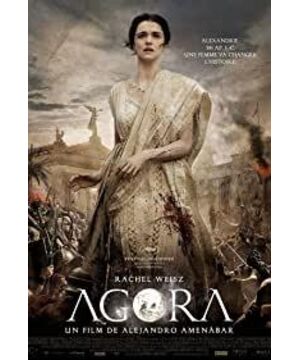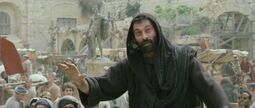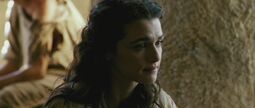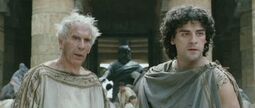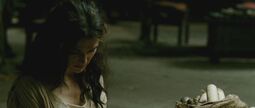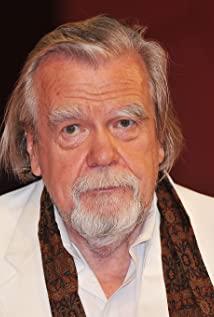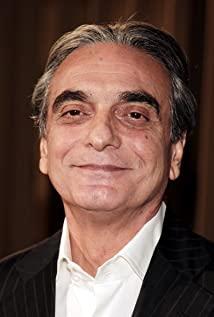To borrow a Wikipedia description of slavery during the Roman Empire:
Slavery in ancient Rome played an important role in society and the economy. Besides manual labour, slaves performed many domestic services, and might be employed at highly skilled jobs and professions. Accountants and physicians were often slaves. Slaves of Greek origin in particular might be highly educated. Unskilled slaves or those sentenced to slavery as punishment, worked on farms, in mines, and at mills: their living conditions were brutual, and their lives short.
The slave Divus in the movie is not the latter of the above descriptions - one of the many miserable, short-lived slaves who work on farms, mines and woods, Divus belongs to the former, those who are highly skilled and professional From the perspective of an old slave beside Hypatia, the heroine of the film (who always accompanies Hypatia in the middle and late stages of the film), Divus's original line will also become an engaged person in the future. A researcher in physics, but at the same time, he was a slave. (In the movie, the heroine always calls Divus David, but I checked the introduction of the movie, the slave's name should be Divus, and when Divus says his name to others, it is also Divus, but Hypatia calls Divus David, more like It's a kind of intimacy that comes from growing up together as a child)
Many people will think that the protagonist of this movie is described as Hypatia, but I think that in this movie, Divus is more like another hidden protagonist throughout the movie.
First borrowed from the opening of the movie, Divus is a slave, and his role is to assist Hypatia in teaching in the library (the first act is peaceful and quiet, and the anger is very harmonious), and then Divus discovers the hostess (also the goddess in the heart) , is flirting with one of her students, which can be regarded as the first time in this little slave's mind that there is a difference between men and women, and in normal times, when Hypatia bathes, it is Divus and another female slave drying Hypatia's body , what is shown here is that in Hypatia's eyes, Divus is a slave, and the slave may be a person, but not a male, so she can stand naked in front of the male slave and let him wipe his body. (In Hypatia's eyes, the change of Divus' identity is that after Divus was besieged in the library, and after the polytheists escaped from the library, Divus returned to Hypatia, but instead of bowing his knees and obeying, he chose to kiss and hug Hypatia. At this moment Hypatia shows resistance and fear, while Divus shows sexual urges as a man, not as a slave.)
And in the second act of the movie, it is also the conflict between polytheism and Christianity that is reflected in the external environment. In the face of polytheism, the elder (who was thrown into the fire later) faced the public mocking Christian preaching. The missionary (later the missionary was more like a vindicator or a warrior): How ignorance ...... my father's father saw them slaughter in the "arena" (didn't understand the word), feed to the lion. This scene reflects the arrogance and prejudice of the polytheistic elders towards Christianity, and then in the next scene when Hypatia's father beats Divus at home because his slave is a Christian, it can be seen from the side that polytheism does not care about ordinary poverty. It is necessary for the lives of the masses, and this is why Christian missionaries have repeated scenes when preaching: what kind of body will put a vase on its head, face the suffering of the world silently and deaf, and at the same time full of arrogance Prejudice confronts dissent, and this scene creates a corresponding conflict between students in Hypatia's teaching early in the film. (This also shows why polytheism will eventually decline, while Christianity can be widely believed in the Roman Empire)
Act 3, when Divus is beaten, Hypatia visits him and finds him After studying astronomy, Divus teaches his understanding of celestial bodies like others in the class, and at the same time, the polytheistic student has an affair with the Christian student Conflict, and then Hypatia faced the conflict among the students and said: We are brothers, we cannot forget this because of the difference of faith, especially in the presence of slaves. Even though Divus has talents that Professor Hypatia's students cannot, he is a slave, which is why in the next scene Divus goes to find the Christian missionary who created the miracle.
In the fourth act, what I felt most deeply was that when the missionaries snatch the bread from Divus' hands, Divus replied: This is my master's (master), if it is given to others, I need to use my own money to repay. At this time, the missionary asked: What do you need money for? Look at their faces. Then Divus realized the kind of give and receive that he had never experienced in his life, and at that moment, what he created in his hands was a miracle. For a moment, although he was still a slave, he was a named Divus, and he looked like a Christian warrior. At this moment, this slave was no longer just a slave. This was also the first time he got someone else. acknowledgment of equal treatment, not of the mercy of his master Hypatia, or of the appreciation of personal property.
In the fifth act, Divus kneels on the ground in the night and prays to his Lord (God), who is willing to give his all if Hypatia refuses the courtship of her pupils. In the end, Hypatia rejects the student's courtship for reasons that Divus does not understand. The blindly obedient Divus further deepened his belief in Christianity, believing that his prayers played a role in all of this.
In the sixth act, at the beginning, the polytheists used extreme violence to let the Christians use their blood to repay the Christians for slandering and insulting the gods of the polytheism, which in turn triggered a violent conflict between the two religions, and at this moment, the polytheists For the first time, believers discovered that there were so many Christian believers in the city, far exceeding the number of polytheists. This scene is more like a kind of polytheism in a position that does not eat human fireworks. Although they have superb skills in philosophy and physics, they are disdainful to understand the life of the poor outside the library. Peacefully face dissident believers. On the contrary, because they have the moral commanding heights in wisdom, they despise dissidents even more. For example, when the polytheists rushed out of the library with weapons, they waved sharp weapons and shouted: God for Peace for Samos. One cannot help but wonder what kind of God would let his followers hold sharp weapons for Peace. Slaughter the unarmed poor people. Of course, this scene is also reflected in the movie Kingdom of Heaven, in which the crusaders raise their swords, shout God for it, and rush towards the Muslim caravan with only a few warriors. And this scene continues to appear repeatedly in this movie. There are several foreshadowings in this scene. One foreshadowing is that a slave of Hypatia's father was beaten by other polytheistic masters because he didn't want to kill Christians, so he couldn't bear to be beaten, so he picked up the sharp weapon in his hand and shouted at Hypatia. His father said: I am a Christian. Another climax was when the Christians gathered together and rushed to the polytheistic library, shouting: Hallelujah, and at this moment the arrogant polytheistic elder confessed for the first time, If they want to quell the contradictions and differences between the two sides, they must have peace talks, but this moment has come too late.
Act VII - The Siege, when the polytheists are besieged in the library, first the slaves cannot enjoy the same food as their masters due to differences in limited food, and then in flight, Hypatia speaks ill of Divus, both Angrily saying that Divus is a slave, and that slaves are stupid. Although Hypatia has praised Divus several times before this scene, in this scene, Divus's slave status is the greatest stimulus to him, and it is also the maximum display of slave status for Hypatia. It is more like a personal property, An image that comes and goes, no matter what, but not a person with an identity equal to Hypatia. Slaves are not equal to people.
The conflict between Christianity and Judaism is highlighted in the later scenes of the film, and this conflict is really just a rewrite of the conflict between polytheism and Christianity in the first half of the film, only because of the growth of this Christianity and its occupation in the government. More than half of the political power (or even all of it later in the film) makes this conflict more exclusiveness and bloodier violence. At this time, when Hypatia was faced with the fanatical blood-washing of Jews by Christianity, she also insisted that what she believed in was philosophy. Although her words at that moment were religious fanaticism, in the face of religion, philosophy has never been the solution to conflict. method, as always is not. At this moment, I don't know whether to use ignorance or arrogance to describe Hypatia, in the face of conflict. In the face of violence, it is the easiest way to control violence with violence, especially in front of ordinary people, and philosophy, which is unattainable, is more like the stars in the sky, which can only be seen from a distance and cannot be touched. And later in the film, Divus also has another alienation, he goes from slave to free man (from Hypatia's mouth), and then to Christian warrior, but as the conflict between Christianity and Judaism escalates, and With the spread of fanatical religious exclusivity, Divus became a member of the Christian fighters. This "member" could not generate his own doubts about Christianity, could not discuss with others, nor could he stop the fanatical behavior of other fighters, even if This kind of behavior hurts Divus' last bit of conscience as a person. Then in the end, as a member of the Christian warrior, he could only choose to follow and remain silent, and finally killed the love of his life-Hypatia at his own hands.
In the end, I have to say that my favorite thing about this movie is the contrast between the universe and Alexandria, quiet and loud. I remember the scene in the 12th episode of the first season of House of Cards, when now Mu and Stark were chatting in the forest, as a rich businessman, Stark recited a verse
Solitary, the thrush... The hermit, withdrawn to himself, avoiding the settlements, sings by himself a song. ---- Walt Whitman, this poem is about the death of Abraham Lincoln.
Shimo said in a later narration: Yes, I know the damn poem. We studied it at the Sentinel. I said to my Professor, "Why morun the death of Presidents, or anyone for that matter? The dead can't hear us" And he asked me if I believed in heaven. "I said no." And then he asked if I had no faith in God. I said,
You have it wrong. It's God who has no faith in us.
PS The main reason for the interspersed Chinese and English in this article is because the movie itself is in English, so many words I feel that if translated into Chinese, the most accurate meaning of the words themselves may be lost, so more English lines from the direct movie script will be used. .
View more about Agora reviews


